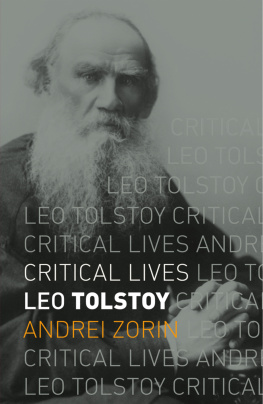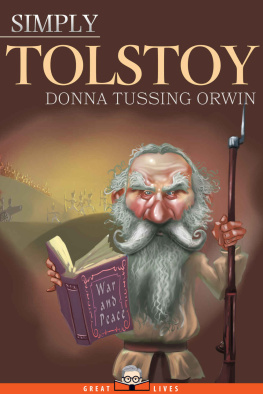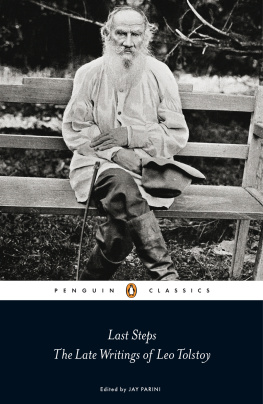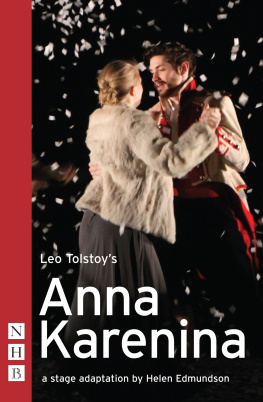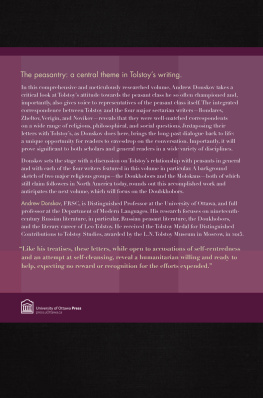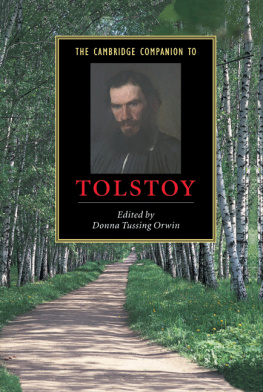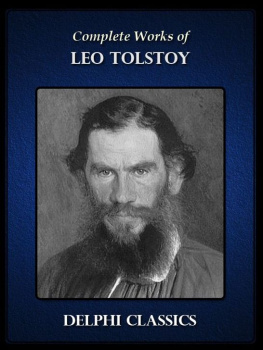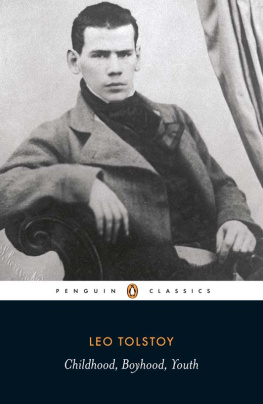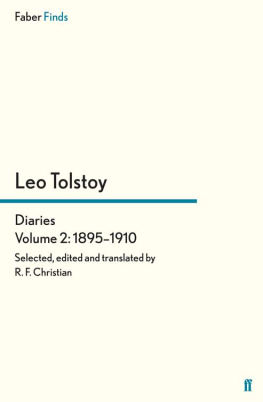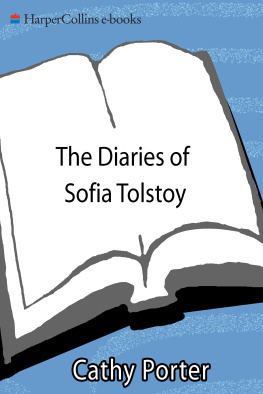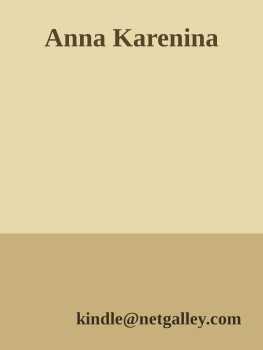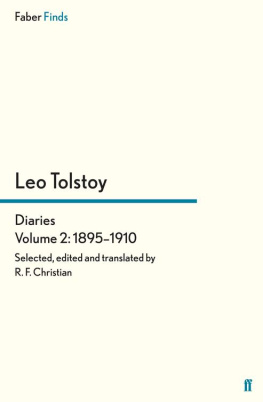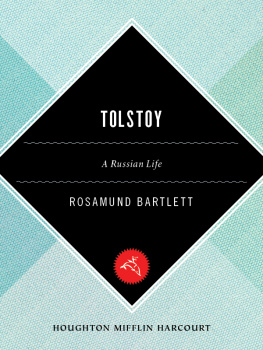
Leo Tolstoy

Titles in the series Critical Lives present the work of leading cultural figures of the modern period. Each book explores the life of the artist, writer, philosopher or architect in question and relates it to their major works.
In the same series
Antonin Artaud David A. Shafer
Roland Barthes Andy Stafford
Georges Bataille Stuart Kendall
Charles Baudelaire Rosemary Lloyd
Simone de Beauvoir Ursula Tidd
Samuel Beckett Andrew Gibson
Walter Benjamin Esther Leslie
John Berger Andy Merrifield
Leonard Bernstein Paul R. Laird
Joseph Beuys Claudia Mesch
Jorge Luis Borges Jason Wilson
Constantin Brancusi Sanda Miller
Bertolt Brecht Philip Glahn
Charles Bukowski David Stephen Calonne
Mikhail Bulgakov J.A.E. Curtis
William S. Burroughs Phil Baker
John Cage Rob Haskins
Albert Camus Edward J. Hughes
Fidel Castro Nick Caistor
Paul Czanne Jon Kear
Coco Chanel Linda Simon
Noam Chomsky Wolfgang B. Sperlich
Jean Cocteau James S. Williams
Salvador Dal Mary Ann Caws
Guy Debord Andy Merrifield
Claude Debussy David J. Code
Gilles Deleuze Frida Beckman
Fyodor Dostoevsky Robert Bird
Marcel Duchamp Caroline Cros
Sergei Eisenstein Mike OMahony
William Faulkner Kirk Curnutt
Gustave Flaubert Anne Green
Michel Foucault David Macey
Mahatma Gandhi Douglas Allen
Jean Genet Stephen Barber
Allen Ginsberg Steve Finbow
Johann Wolfgang von Goethe Jeremy Adler
Gnter Grass Julian Preece
Ernest Hemingway Verna Kale
Langston Hughes W. Jason Miller
Victor Hugo Bradley Stephens
Derek Jarman Michael Charlesworth
Alfred Jarry Jill Fell
James Joyce Andrew Gibson
Carl Jung Paul Bishop
Franz Kafka Sander L. Gilman
Frida Kahlo Gannit Ankori
Sren Kierkegaard Alastair Hannay
Yves Klein Nuit Banai
Arthur Koestler Edward Saunders
Akira Kurosawa Peter Wild
Lenin Lars T. Lih
Pierre Loti Richard M. Berrong
Jean-Franois Lyotard Kiff Bamford
Ren Magritte Patricia Allmer
Stphane Mallarm Roger Pearson
Thomas Mann Herbert Lehnert and Eva Wessell
Gabriel Garca Mrquez Stephen M. Hart
Karl Marx Paul Thomas
Guy de Maupassant Christopher Lloyd
Herman Melville Kevin J. Hayes
Henry Miller David Stephen Calonne
Yukio Mishima Damian Flanagan
Eadweard Muybridge Marta Braun
Vladimir Nabokov Barbara Wyllie
Pablo Neruda Dominic Moran
Georgia OKeeffe Nancy J. Scott
Octavio Paz Nick Caistor
Pablo Picasso Mary Ann Caws
Edgar Allan Poe Kevin J. Hayes
Ezra Pound Alec Marsh
Marcel Proust Adam Watt
Arthur Rimbaud Seth Whidden
John Ruskin Andrew Ballantyne
Jean-Paul Sartre Andrew Leak
Erik Satie Mary E. Davis
Arnold Schoenberg Mark Berry
Arthur Schopenhauer Peter B. Lewis
Dmitry Shostakovich Pauline Fairclough
Adam Smith Jonathan Conlin
Susan Sontag Jerome Boyd Maunsell
Gertrude Stein Lucy Daniel
Stendhal Francesco Manzini
Igor Stravinsky Jonathan Cross
Rabindranath Tagore Bashabi Fraser
Pyotr Tchaikovsky Philip Ross Bullock
Leo Tolstoy Andrei Zorin
Leon Trotsky Paul Le Blanc
Mark Twain Kevin J. Hayes
Richard Wagner Raymond Furness
Alfred Russel Wallace Patrick Armstrong
Simone Weil Palle Yourgrau
Tennessee Williams Paul Ibell
Ludwig Wittgenstein Edward Kanterian
Virginia Woolf Ira Nadel
Frank Lloyd Wright Robert McCarter
Leo Tolstoy
Andrei Zorin
REAKTION BOOKS
In memory of Boris (Barukh) Berman
Published by Reaktion Books Ltd
Unit 32, Waterside
4448 Wharf Road
London N1 7UX, UK
www.reaktionbooks.co.uk
First published 2020
Copyright Andrei Zorin 2020
All rights reserved
No part of this publication may be reproduced, stored in a retrieval system or transmitted, in any form or by any means, electronic, mechanical, photocopying, recording or otherwise, without the prior permission of the publishers
Page References in the Photo Acknowledgements Match the Printed Edition of this Book.
Printed and bound in India by Replika Press Pvt. Ltd
A catalogue record for this book is available from the British Library
eISBN: 978 1 78914 256 3
Contents
Abbreviations
AK | Leo Tolstoy, Anna Karenina, trans. George Gibian (London and New York, 1995) |
AT | Alexandra Tolstoy, Otets. Zhizn Lva Tolstogo, 2 vols (New York, 1953) |
Ch-Ls | Anton Chekhov, A. P. Polnoe sobranie sochinenii i pisem: Pisma v dvenadtsati tomah, 12 vols (Moscow, 197483) |
CW | Leo Tolstoy, Polnoe sobranie sochinenii, 90 vols (Moscow, 192864) |
Ds | Tolstoys Diaries, trans. R. F. Christian (London, 1994) |
Kuz | Tatiana Kuzminskaya, Moia zhizn doma i v Yasnoi Polyane (Tula, 1973) |
LNT & AAT | L. N. Tolstoy i A. A. Tolstaya: Perepiska, 18571903 (Moscow, 2011) |
Ls | Tolstoys Letters, ed. and trans. R. F. Christian, 2 vols (New York, 1978) |
Mak | Dushan Makovitsky, U Tolstogo, 19041910: Yasnopolianskie zapiski, Literaturnoe nasledstvo, xc/14 (1979) |
SAT-Ds | Sofia Tolstaya, Dnevniki, 2 vols (Moscow, 1978) |
SAT-ML | Sofia Tolstaya, Moia zhizn, 2 vols (Moscow, 2011) |
TP | Leo Tolstoy, Perepiska s russkimi pisateliami, ed. S. Rozanova, 2 vols (Moscow, 1978) |
TSF | Tolstoys Short Fiction, trans. Michael Kats (London and New York, 2008) |
WP | Leo Tolstoy, War and Peace, trans. George Gibian (London and New York, 1996). |
1
An Ambitious Orphan
In May 1878, finishing Anna Karenina and in the early stages of the deepest spiritual crisis he had ever experienced, Tolstoy started drafting his memoirs, which he provisionally called My Life. In one day he wrote several disjointed fragments describing his impressions of certain events from his childhood. He did not complete his memoirs and never returned to these fragments, the first of which was as follows:
Here are my first recollections. I am bound up, I want to free my hands and I cannot do it. I shout and weep and my cries are unpleasant to me, but I cannot stop. There were people bent over me, I do not remember who they were, and it all happened in semi-darkness, but I do remember that there were two of them, they are worried by my cries, but do not unbind me, which I want them to do, and therefore I cry even louder. It seems that for them it is necessary [that I must be bound up], while I know that it is not necessary, and I want to prove it to them and I indulge in crying that repels me, but which is uncontainable. I feel the injustice and cruelty not of people, because they pity me, but of fate and pity for myself. I do not know and shall never know what this was about... but it is certain that this was the first and the most powerful impression of my life. And what is memorable is not my cries, or my suffering, but the complex, contradictory nature of the impression. I want freedom, it wont harm anyone and yet they keep torturing me. They pity me and they tie me up, and I, who needs everything, am weak and they are strong. (CW, XXIII, pp. 46970)
Next page
